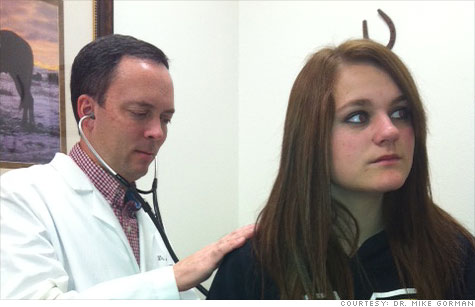@CNNMoney January 6, 2012: 9:39 AM ET

Dr. Mike Gorman has taken out an SBA loan to keep his rural solo
practice running in Logandale, Nevada
NEW YORK (CNNMoney) -- Doctors in America are harboring an embarrassing secret: Many of them are going broke.
Industry watchers say the trend is worrisome. Half of all doctors in the nation operate a private practice. So if a cash crunch forces the death of an independent practice, it robs a community of a vital health care resource.
"A lot of independent practices are starting to see serious financial issues," said Marc Lion, CEO of Lion & Company CPAs, LLC, which advises independent doctor practices about their finances.
Doctors list shrinking insurance reimbursements, changing regulations, rising business and drug costs among the factors preventing them from keeping their practices afloat. But some experts counter that doctors' lack of business acumen is also to blame.
Loans to make payroll: Dr. William Pentz, 47, a cardiologist with a Philadelphia private practice, and his partners had to tap into their personal assets to make payroll for employees last year. "And we still barely made payroll last paycheck," he said. "Many of us are also skimping on our own pay."
Pentz said recent steep 35% to 40% cuts in Medicare reimbursements for key cardiovascular services, such as stress tests and echocardiograms, have taken a substantial toll on revenue. "Our total revenue was down about 9% last year compared to 2010," he said.
12 entrepreneurs reinventing health care
"These cuts have destabilized private cardiology practices," he said. "A third of our patients are on Medicare. So these Medicare cuts are by far the biggest factor. Private insurers follow Medicare rates. So those reimbursements are going down as well."Pentz is thinking about an out. "If this continues, I might seriously consider leaving medicine," he said. "I can't keep working this way."
Also on his mind, the impending 27.4% Medicare pay cut for doctors. "If that goes through, it will put us under," he said.
Federal law requires that Medicare reimbursement rates be adjusted annually based on a formula tied to the health of the economy. That law says rates should be cut every year to keep Medicare financially sound.
Although Congress has blocked those cuts from happening 13 times over the past decade, most recently on Dec. 23 with a two-month temporary "patch," this dilemma continues to haunt doctors every year.
Beau Donegan, senior executive with a hospital cancer center in Newport Beach, Calif., is well aware of physicians' financial woes.
"Many are too proud to admit that they are on the verge of bankruptcy," she said. "These physicians see no way out of the downward spiral of reimbursement, escalating costs of treating patients and insurance companies deciding when and how much they will pay them."
Donegan knows an oncologist "with a stellar reputation in the community" who hasn't taken a salary from his private practice in over a year. He owes drug companies $1.6 million, which he wasn't reimbursed for.
Dr. Neil Barth is that oncologist. He has been in the top 10% of oncologists in his region, according to U.S. News Top Doctors' ranking. Still, he is contemplating personal bankruptcy.
That move could shutter his 31-year-old clinical practice and force 6,000 cancer patients to look for a new doctor.
Changes in drug reimbursements have hurt him badly. Until the mid-2000's, drugs sales were big profit generators for oncologists.
In oncology, doctors were allowed to profit from drug sales. So doctors would buy expensive cancer drugs at bulk prices from drugmakers and then sell them at much higher prices to their patients.
"I grew up in that system. I was spending $1.5 million a month on buying treatment drugs," he said. In 2005, Medicare revised the reimbursement guidelines for cancer drugs, which effectively made reimbursements for many expensive cancer drugs fall to less than the actual cost of the drugs.